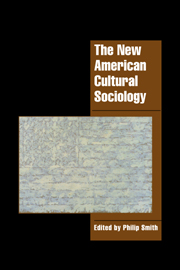Book contents
- Frontmatter
- Contents
- Notes on contributors
- Preface
- The new American cultural sociology: an introduction
- PART I Culture as text and code
- PART II The production and reception of culture
- 6 The reception of Derrida's work in France and America
- 7 Censorship, audiences, and the Victorian nude
- 8 The Devil, social change, and Jacobean theatre
- 9 Victorian women writers and the prestige of the novel
- 10 The ambiguous and contested meanings of the Vietnam Veterans Memorial
- PART III Culture in action
- Index
- Title in this Series
9 - Victorian women writers and the prestige of the novel
Published online by Cambridge University Press: 18 January 2010
- Frontmatter
- Contents
- Notes on contributors
- Preface
- The new American cultural sociology: an introduction
- PART I Culture as text and code
- PART II The production and reception of culture
- 6 The reception of Derrida's work in France and America
- 7 Censorship, audiences, and the Victorian nude
- 8 The Devil, social change, and Jacobean theatre
- 9 Victorian women writers and the prestige of the novel
- 10 The ambiguous and contested meanings of the Vietnam Veterans Memorial
- PART III Culture in action
- Index
- Title in this Series
Summary
To account for the complete lack not only of good women writers but also of bad women writers I can conceive no other reason unless it be that there was some external restraint upon their powers.
Virginia WoolfStudents of women's participation in the arts have persuasively argued that the relative dearth of famous women writers and artists results from the historical structure of opportunities – or more accurately, lack of them. For instance, until recently, women writers, artists, and composers had less formal education and training than their male counterparts. Except for the daughters of families in the arts, as well as some of the social elite, women were frequently excluded from the social networks central to cultural milieus (Showalter 1977; Tuchman 1975). But the structure of opportunity is not merely a matter of training and association with others intent on learning and creating an art. It also results from the esteem or prestige accorded a genre, which is in turn strongly influenced by socio-economic developments and institutional configurations.
The purpose of this chapter is to suggest that the growing prestige of the novel in England in the Victorian period was one of the factors limiting the opportunities for women to have their work seriously considered and to achieve fame. Our procedure is to examine the fate of manuscripts that women and men submitted to one publishing house, Macmillan and Company in London, between November 1866 and December 1887.
We have analyzed our data, not qualitatively, but statistically. By so doing, we hope both to reveal patterns that might otherwise remain hidden and to show some of the possibilities of a sociological approach to literary history.
- Type
- Chapter
- Information
- The New American Cultural Sociology , pp. 141 - 150Publisher: Cambridge University PressPrint publication year: 1998



